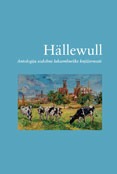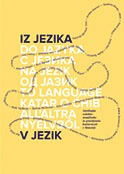Hällewul. Anthology of Contemporary Luxembourgian Literature
The 9th volume of the Vilenica Antholoigies series dedicated to lesser known European literatures bears the title Hällewull, which means “a whole heap of something” in Luxembourgian. The anthology of contemporary Luxembourgian literature was edited by Guy Helmingerand Vesna Kondrič Horvat and features 21 male and female authors, representatives of the “Luxemburgensie” (creators of Luxembourgian literature), which is lesser known to the Slovenian public. Luxembourgian literature is not written in the official languages of the duchy – Luxembourgian, German and French – exclusively, but also comes to life in English as well as in the languages of the local immigrants. The authors featured in the anthology are: Nico Helminger, Guy Rewenig, Jhemp Hoscheit, Pol Greisch, Claudine Muno, Jean Portante, Lambert Schlechter, Jean Sorrente,Alexandra Fixmer, Ian De Toffoli, Anise Koltz, Nora Wagener, Guy Helminger, Michèle Thoma, Pol Sax, Guy Wagner, Margret Steckel, Jean Back, Elise Schmit, Georges Hausemer and Pierre Joris. The featured texts were translated from German, French and English to Slovene by Vesna Kondrič Horvat, Mojca Kranjc, Meta Lah, Amalija Maček,Mojca Schlamberger Brezar, Veno Taufer and Primož Vitez. The author of the accompanying study outlining the history of Luxembourgian literature from the first literary work dating back to the Middle Ages until today is Georges Hausemer, one of the most important contemporary Luxembourgian writers in his own right. The anthology follows the visual appearance of the series, with its cover containing a representative work by one of local artists. The paintingIndustrie und Weideland (Industry and Pasturage) by renowned artist Fernand Bertemes illustrates the dichotomy between the northern agricultural part of Luxembourg and the southern part of the duchy characterised by the local steel industry.
The publication of the anthology has been made possible through the kind support by the Ministry of Culture of the Grand Duchy of Luxembourg and the Slovenian Book Agency.
From Language to Language. Anthology of Contemporary Ethnic Minority and Immigrant Literature in Slovenia
The anthology Iz jezika v jezik (From Language to Language) is the first ever anthology to feature literary texts by male and female authors who live in Slovenia and either write in their native language exclusively or in their native language as well. The number of such authors is quite impressive. From more than 120 authors, 92 were considered for inclusion (60 participated in the call for submissions issued by the Slovene Writers’ Association; with contributions by an additional 32 authors being selected and surveyed by co-editors, consultants, workshop participants and Lidija Dimkovska – the editor-in-chief). Finally, texts by 34 male and female authors; members of ethnic minorities and immigrants; originally written in 9 different native languages – Hungarian, Italian, Romani, Slovak, Macedonian, Bosnian, Croatian, Serbian and English – were selected, translated into Slovene and included in the anthology. The title of the anthology emphasises the significance of transmitting/translating literary texts from one language to another. The inclusion of original texts and their respective translations in the anthology has both practical and symbolic meaning: the same book/dwelling can namely harbour all of the featured languages – for however different they may be, they are all equal. The anthology was compiled by means of a slightly different approach. The selection and editing was not conducted by the editor-in-chief alone. The selection was namely undertaken in an interactive manner based on a collaboration between the editor-in-chief, a number of co-editors for the individual languages (Erica Johnson Debeljak for English, Ivan Antić for Serbian, Jadranka Matić Zupančič for Croatian, Ismet Bekrić for Bosnian, Sonja Cekova Stojanoska for Macedonian, Lajos Bence for Hungarian and Mario Steffe for Italian) and 25 aspiring editors and cultural managers who participated in training workshops. The anthology represents the answer to a lasting demand for highlighting and introducing such authors – members of ethnic minorities and immigrants living in Slovenia – into the Slovene literary realm. The anthology provides male and female authors who write in other languages with time and space to make an impression on the Slovenian literary scene, which in turn expands, broadens its frame and consequently becomes more interesting and diverse.
The anthology represents the culmination of the Training Course for Cultural Managers and Editors project under the auspices of the Slovene Writers’ Association. The project is supported by the European Social Fund – a structural fund of the European Union.



